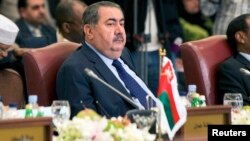Prime Minister Nuri al-Maliki and his security officials are to blame for the rise of Sunni Muslim insurgents who have seized parts of Iraq, the country's foreign minister said.
The comments by Hoshiyar Zebari, a Kurd, are likely to worsen relations between Maliki's Shi'ite Muslim-led government and the Kurds, complicating efforts to form a power-sharing government capable of countering Islamic State militants.
At the stake is the survival of Iraq as a unified country. Islamic State have declared a medieval-style caliphate spanning parts of Iraq and Syria they control, alarming other Arab states who fear their campaign will embolden militants on their patch.
“Surely the man who is responsible for the general policies bears the responsibility and the general commander of the armed force, the ministers of defense and interior also bear these responsibilities,” Zebari told al-Arabiya television.
“There are other sides who bear responsibility, maybe political partners, but the biggest and greatest responsibility is on the person in charge of public policies.”
On Friday, Saudi Arabia's King Abdullah called on regional leaders and religious scholars to prevent Islam from being hijacked by militants. He named no groups but was alluding to violence in neighboring countries, including Iraq and Syria, where the Islamic State has executed scores of people and imposed their radical views in areas they captured.
In July, the Kurdish political bloc ended all participation in Iraq's national government in protest over Maliki's accusation that Kurds were allowing terrorists to stay in Arbil, the capital of their semi-autonomous region known as Kurdistan.
Maliki is currently ruling in a caretaker capacity, having won a parliamentary election in April but failing to win enough support from the Kurdish and Arab Sunni minorities as well as fellow Shi'ites to form a new government.
The United States, the United Nations and Iraq's own Shi'ite clerics have urged lawmakers to form a new government swiftly to deal with the Sunni insurgency.
Biggest threat since Saddam's fall
Islamic State's offensive has whipped up sectarian tensions and threatened to dismember Iraq. The sectarian conflict poses the biggest danger to the OPEC member's stability since the 2003 fall of Saddam Hussein after a U.S.-led invasion.
Maliki has appointed Hussain al-Shahristani, the Shi'ite deputy prime minister, as acting foreign minister.
The Kurds have long dreamed of their own independent state, an aspiration that anger Maliki, who has frequently clashed with the non-Arabs over budgets, land and oil.
After the Sunni militants arrived almost unopposed by the army, Kurdish forces seized two oilfields in northern Iraq and took over operations from a state-run oil company.
In another move certain to infuriate the government, the Kurdish region is pressing Washington for sophisticated weapons it says Kurdish fighters need to push back Islamist militants, Kurdish and U.S. officials said.
Kurdish peshmerga fighters and Shi'ite militias now rival the Iraqi army in its ability to confront the Islamic State, whose fighters had taken control of parts of western Iraq before their advance through the north.
The Sunni insurgents have paused their campaign in towns just north of Baghdad, which could partly explain why U.N. figures show the number of Iraqi deaths dropped to 1,737 people, mostly civilians, in July compared to 2,400 in June.
Still, violence is part of everyday life.
Roadside bombs killed four people near a square in central Baghdad on Friday, medical and security sources said.
There are signs of a backlash among Iraqis against the Islamic State, which has blown up mosques and shrines and imposed its ultra hardline vision of Islam in Mosul and other cities in controls in the north.
One of the Islamic State's propaganda centers in Mosul, which contains a big screen where the group showcases its operations, was set ablaze on Friday night, a witness said.





